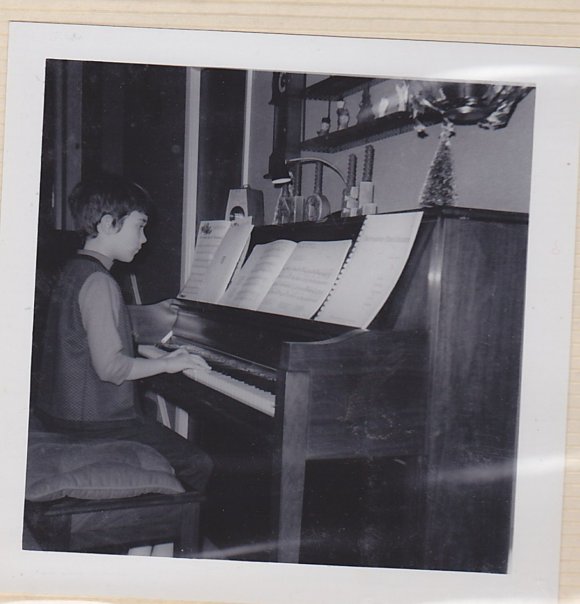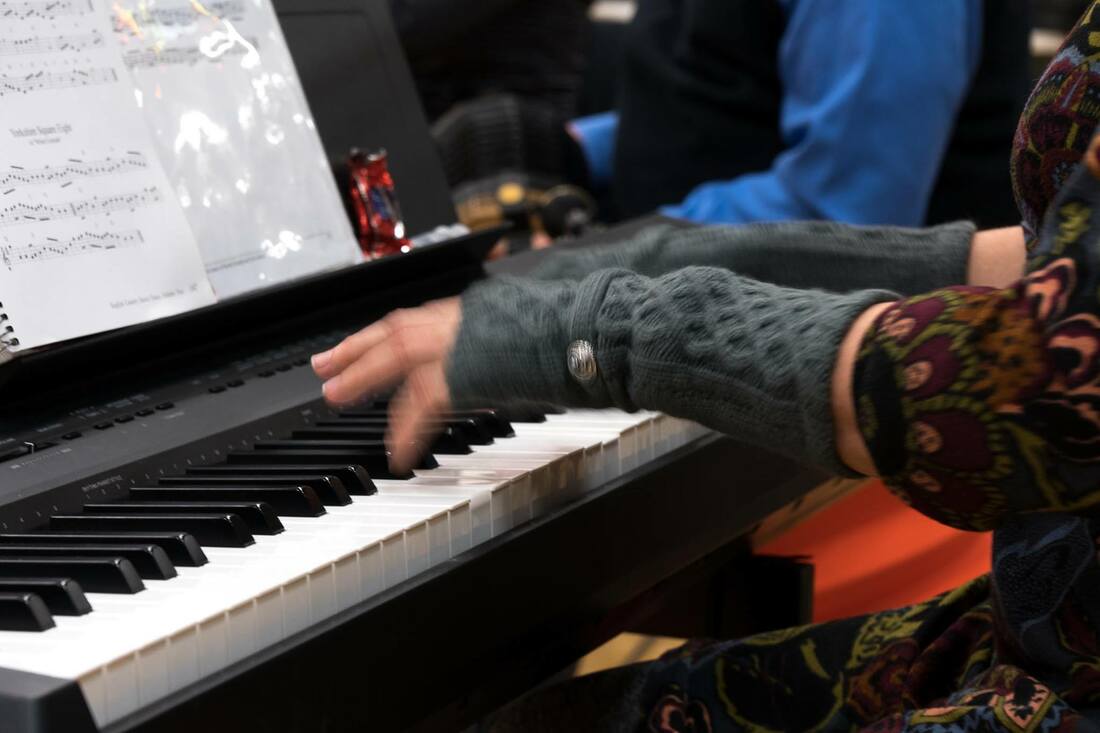The chipped black kitchen timer ticked loudly, mechanically, incessantly from it’s perch on top of the piano. Playing a few desultory notes, I looked up at it balefully. God, I hated that thing. We’d been through a lot together – all the way from “If you don’t finish your dinner by the time that goes off you’ll go to bed hungry!” to… this - the dreaded daily piano practice.
It was clear I was ready to quit piano lessons. At ten, I was already in love with making music and the freedom of it flowing from my fingers. What I hated were these awful stretches of time, staring at the music, trying to figure out how to make it come to life. I looked back at the timer. “It’s a good thing you can’t talk,” I muttered. In response, a disembodied voice floated down the stairs. “Robbin, what are you doing down there?” Startled, I guiltily replied “Nothing Mom, just getting out my next piece.” With that, I reached a furtive hand up and turned the timer back one minute. Ah, blessed relief from torture. And no one would ever know….
It was clear I was ready to quit piano lessons. At ten, I was already in love with making music and the freedom of it flowing from my fingers. What I hated were these awful stretches of time, staring at the music, trying to figure out how to make it come to life. I looked back at the timer. “It’s a good thing you can’t talk,” I muttered. In response, a disembodied voice floated down the stairs. “Robbin, what are you doing down there?” Startled, I guiltily replied “Nothing Mom, just getting out my next piece.” With that, I reached a furtive hand up and turned the timer back one minute. Ah, blessed relief from torture. And no one would ever know….
I might as well admit here and now that good regular practice habits have never been easy for me as a musician. Getting myself to the piano is half the battle. My husband rushes home from work, and the first thing he does is grab his concertina and start joyfully woodshedding some piece of music. My response, inevitably, is “You’ve got to be kidding.” This may have something to do with working professionally in music for over 30 years. It’s taken a while for the joy of it to return to my life, although that seems to get better every year since I’ve been out of the classroom.
Obviously, I’ve spent countless hours at the piano. For many years, as a student, I practiced 3 hours a day. It took me until adulthood and my journey into Alexander Technique to learn how to practice “smart” instead of “long.”
Those of you who know me as a musician and a teacher know that I’m a theory and analysis geek. So I have spent plenty of time reading and analyzing articles on good practice, and learning techniques that I now pass on to my piano students for efficient, effective practice. I finally understand that sitting for long periods of time making the same mistakes over and over again will never make me a better musician. Instead, I have to make some choices that let me shake up my playing - working transitions, starting a piece at the end instead of the beginning, playing scales down first instead of up – that help me break out of my habitual rut. Thinking through this is actually fun for me. My playing has freed up now that I have set myself free from the same old practice routines, and the idea that I need to be at the piano for a certain length of time each day.
Looking back at that early time, I realize now that there were two problems at play – first, I hadn’t really been taught how to practice, and second, nothing had come along yet that made me want to keep going musically. Happily for me, the second problem resolved itself the following year, when we got a school music teacher who couldn’t play the piano. I started accompanying choirs and fell in love all over again with that challenge. I had to add lots of practice time to keep up with learning those pieces in addition to my own. The positive feedback at school started me down the path to becoming a professional musician.
Years later, my mom and I were talking about that difficult time period. I asked her if she ever knew that I was turning back the timer, or if I’d really gotten away with it. She burst out laughing. “Of course I knew! You were supposed to be down there for 20 minutes, and you were back upstairs in 5. I didn’t know what to do about it, so I called your piano teacher. She said that if I forced you to practice, you’d quit. If I were just patient with you, sooner or later you’d move past this phase and want to keep going. It was really hard for me not to get mad at you, but she was right.” Another childhood illusion shattered!
I share the timer story often with my despairing piano parents. As a teacher, I always know when students hit a plateau – suddenly what was easy is hard, it’s “not fun” anymore, and practicing regularly loses its allure. At this point, forcing kids to practice won’t help. I hope that in their lessons I’m giving my students techniques, choices and practice ideas that will make it fun again for them. There really is nothing like the freedom of music, flowing out of our fingertips.
Do you make choices available to yourself when you hit a plateau?
What habits of a lifetime do you have to see you through the difficult times?
Obviously, I’ve spent countless hours at the piano. For many years, as a student, I practiced 3 hours a day. It took me until adulthood and my journey into Alexander Technique to learn how to practice “smart” instead of “long.”
Those of you who know me as a musician and a teacher know that I’m a theory and analysis geek. So I have spent plenty of time reading and analyzing articles on good practice, and learning techniques that I now pass on to my piano students for efficient, effective practice. I finally understand that sitting for long periods of time making the same mistakes over and over again will never make me a better musician. Instead, I have to make some choices that let me shake up my playing - working transitions, starting a piece at the end instead of the beginning, playing scales down first instead of up – that help me break out of my habitual rut. Thinking through this is actually fun for me. My playing has freed up now that I have set myself free from the same old practice routines, and the idea that I need to be at the piano for a certain length of time each day.
Looking back at that early time, I realize now that there were two problems at play – first, I hadn’t really been taught how to practice, and second, nothing had come along yet that made me want to keep going musically. Happily for me, the second problem resolved itself the following year, when we got a school music teacher who couldn’t play the piano. I started accompanying choirs and fell in love all over again with that challenge. I had to add lots of practice time to keep up with learning those pieces in addition to my own. The positive feedback at school started me down the path to becoming a professional musician.
Years later, my mom and I were talking about that difficult time period. I asked her if she ever knew that I was turning back the timer, or if I’d really gotten away with it. She burst out laughing. “Of course I knew! You were supposed to be down there for 20 minutes, and you were back upstairs in 5. I didn’t know what to do about it, so I called your piano teacher. She said that if I forced you to practice, you’d quit. If I were just patient with you, sooner or later you’d move past this phase and want to keep going. It was really hard for me not to get mad at you, but she was right.” Another childhood illusion shattered!
I share the timer story often with my despairing piano parents. As a teacher, I always know when students hit a plateau – suddenly what was easy is hard, it’s “not fun” anymore, and practicing regularly loses its allure. At this point, forcing kids to practice won’t help. I hope that in their lessons I’m giving my students techniques, choices and practice ideas that will make it fun again for them. There really is nothing like the freedom of music, flowing out of our fingertips.
Do you make choices available to yourself when you hit a plateau?
What habits of a lifetime do you have to see you through the difficult times?
Robbin at the piano with her band, Reelplay.
Photo credit Doug Plummer, all rights reserved.
Photo credit Doug Plummer, all rights reserved.


 RSS Feed
RSS Feed